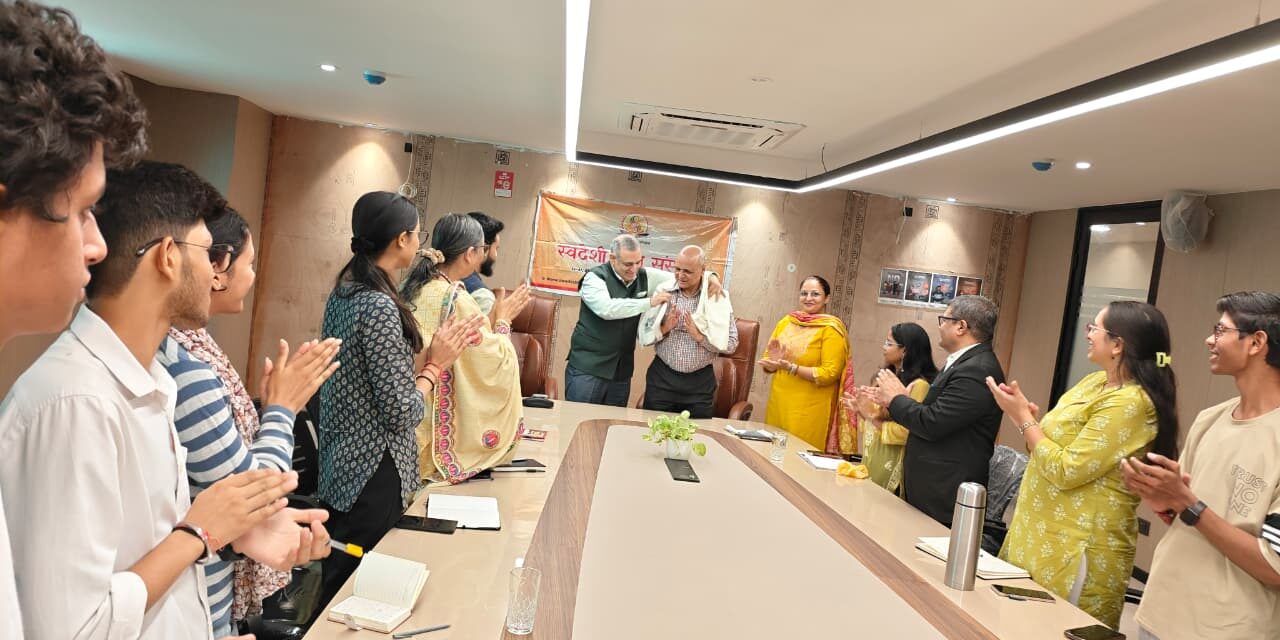Visit of Prof. Bhagwati Prakash Sharma at Swadeshi Shodh Sansthan
Prof. Bhagwati Prakash Sharma (Vice Chairman, Swadeshi Shodh Sansthan; Convenor, Swavlamban Bharat Nyas; and Chairperson, Governing Board of UNESCO MGIEP) visited the Swadeshi Shodh Sansthan (SSS) office at ITO, New Delhi, on 9th October 2025 at 1:00 PM. He was warmly welcomed by Shri Sanjay Kundu (Member, Board of Advisors, SSS, and former DGP, Himachal Pradesh), Dr. Sarabjeet Kaur (Secretary, SSS), and other guests and researchers present at the Sansthan. The Sansthan extended heartfelt congratulations to Prof. Sharma for being conferred with the Rashtriya Shiksha Bhushan Award 2025 by the Akhil Bhartiya Rashtriya Shikshak Mahasangh (ABRSM).
Welcome Address: Dr. Sarabjeet Kaur introduced and welcomed the esteemed guest, highlighting his visionary leadership and valuable contribution to the field of education and Swadeshi thought.
Remarks by Prof. Bhagwati Prakash Sharma
Prof. Sharma began his address by sharing insightful suggestions for strengthening the research ecosystem of Swadeshi Shodh Sansthan. He emphasized that empirical data generation across all disciplines is essential, as “data is power and wealth in today’s world”. He offered the following recommendations for researchers and the institution:
- SSS should focus on generating and utilizing empirical data across all fields of study.
- Researchers should classify and apply data relevant to their areas of specialization.
- To ensure data security and easy accessibility, researchers may organize their data into categorized folders in their email.
- They should regularly download and store quality research papers and relevant news articles for future reference.
- Each researcher should work toward creating their own database according to their subject or stream.
- There is a growing need for interdisciplinary research to study complex national and global issues.
- The Sansthan should actively engage with emerging technologies and refer to authentic, original sources of data and research.
- Researchers should “read between the lines”, understanding the deeper context and intent behind words and ideas.
- SSS should also prioritize cause-and-effect-based research, focusing on analytical and evidence-driven outcomes.
In the domain of networking and institutional collaboration, Prof. Sharma further advised:
- Prepare a list of research supervisors along with their specializations from institutions that have signed MOUs with SSS.
- Download doctoral thesis (from the last five years) from these institutions to identify emerging research trends.
- Organize at least one annual conference that can guide and shape the future research agenda of SSS.
- Compile a list of periodical journals and newsletters published by partner institutions.
- Ensure that all MOU-signed institutions are regularly informed about the activities and initiatives of Swadeshi Shodh Sansthan.
Address by Shri Sanjay Kundu
In his remarks, Shri Sanjay Kundu reflected on India’s journey toward the centenary of its independence in 2047, envisioning the nation’s rise as a Vishwa Guru, a global leader grounded in intellectual strength, institutional reform, and technological innovation. He emphasized that to attain this vision, India must first address its internal challenges by transforming social and regional diversities into strengths that promote unity. He described the Swadeshi Shodh Sansthan (SSS) as a policy-oriented think tank committed to driving original, data-based, and nationally aligned research.
Shri Kundu highlighted the need to invest in the “Trinity of Future Technologies”, Artificial Intelligence, Quantum Computing, and Nuclear Fusion, identifying them as pillars of India’s future global competitiveness. He stressed the importance of turning disruptions into opportunities, maintaining stability in India’s neighbourhood through diplomacy and development, and enhancing India’s global presence through leadership and youth participation in international institutions. He further underscored the importance of economic reforms, revitalization of Public Sector Undertakings (PSUs), and the promotion of seven growth drivers: IT, Nuclear Energy, Health Tech, Manufacturing, Agri-Tech, Finance, and Faith-Tech, as foundations of sustainable national progress.
In conclusion, Shri Kundu envisioned the coming 25 years as an era of Indian renaissance, where Swadeshi thought aligns with global leadership. He stated that India’s path to becoming a Vishwa Guru lies in harmonizing research, technology, governance, and civilizational wisdom, paving the way for a prosperous and self-reliant Bharat by 2047.
The event was concluded with a vote of thanks delivered by Prof. Nandini Sinha Kapoor, followed by high tea.






